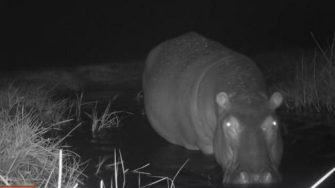
This project is focused on wild populations of hippos in the Okavango Delta and Chobe River, northern Botswana, examining the spatial ecology, density, distribution, group size, and demographics of hippos using a remotely piloted aircraft (i.e. drone). We are trying to determine and quantify the impact of hippo movement on the geomorphology and hydrology of areas through the creation of hippo trails. Understanding the scope and specifics of their role as ecosystem engineers will shed light on the potential consequences of further declines in hippopotamus numbers on the delta. In addition, the project incorporates observational studies to further our knowledge of hippo behaviour, in particular understanding how hippos use their habitat. Compared to other threatened African megafauna, little is known about hippo biology and ecology, despite their importance as ecosystem engineers. Of the 36 countries that contain hippo populations, the majority of studies have focussed on populations in just a few countries. This project is the first dedicated study conducted on hippos in Botswana.

